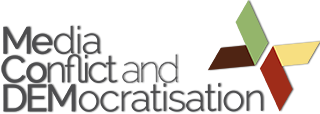A comparative analysis of civil society, media and conflict by Rebecca Pointer, Tanja Bosch, Wallace Chuma and Herman Wasserman is now available!
Download at: http://www.mecodem.eu/publications/working-papers
Executive Summary
This paper explores how Egyptian, Kenyan, Serbian and South African civil society organisations (CSOs) use communication and relationships with media to engage in democratic contestation. Individual interviews were conducted with 91 CSO members who participated in the various democratisation conflicts listed in MeCoDEM’s research design. Qualitative analysis was then used to look at how the activists perceived the importance of the media, their efforts to get media coverage, their perceptions of the quality of media coverage of the conflict, and the importance of social media in their activism around these conflicts. Finally, this paper covers the interviewees’ perceptions of democracy and how the conflicts relate to their country’s democratic dispensations.
- The study found that key sources of conflict identified by the interviewees included group identity (e.g. religious and ethnic identity) and contestations around notions of citizenship.
- Interviewees also identified the distribution and control of power was another key source of conflict – Egyptian, Serbian and South African activists all placed significant importance on networked civil society. Thus, communications among members and with the outside world was key to redistributing power.
- However, Kenya’s CSOs saw their power as stemming from the ability to build healthy relationships between different groups of people, and so the primary communication activities centred on citizen education.
- Egyptian, Kenyan and Serbian activists viewed regular elections as a key marker of democracy, and the media was correct to focus on such issues. But South African activists suggested that the media focussed too much attention on elections, and not enough given to local participatory mechanisms of listening to citizens.
Across all four countries regular elections, the existence of civil society, and its representation in the media, were not necessarily seen as enough to guarantee stable democracies. While the media provided some space and coverage of civil society activities, CSOs in all countries felt that the media often played a detrimental role in democracy, either by superficial coverage, or by flagrantly highlighting conflict in a way that increased polarisation. Therefore, CSO activities – including their communication activities – could be seen as contesting identity and citizenship, contesting the state, and contesting the media.
